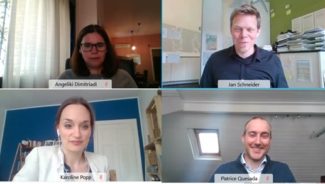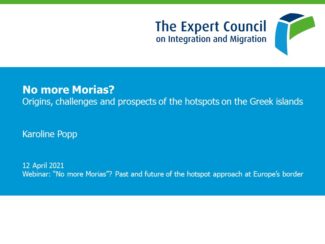Veranstaltungen – Wissenschaftlicher Stab
“No more Morias?” Past and future of the hotspot approach at Europe’s border
Webinar on 12.4.2021
The situation in the refugee camps on the Greek islands has been a cause of grave concern, long before the threat of the COVID-19 pandemic and the fire at the Moria refugee camp in September 2020. More than five years after the so-called hotspots were set up, efficient asylum procedures remain elusive and reception standards in the camps are extremely poor. As debates continue over the future of European asylum policy – not least in the context of the new EU Pact on Migration and Asylum – the question arises as to what lessons can be learned from the Greek experience.
In this webinar the SVR provided an insight into the factors underlying the situation in Greece and asked what the future may hold for the Greek hotspots and also discussed how the “hotspot model” and border procedures are being used and could be improved at other locations at Europe’s external borders.
After a brief welcome by Dr. Jan Schneider, Head of SVR Research Unit, Karoline Popp, researcher at SVR presented the results of the Policy Brief “No more Morias”? Origins, challenges and prospects of the hotspots on the Greek islands. She focussed on the historical and structural origins of the problem, in particular the three main factors shaping the situation in Greece: 1) The EU-Turkey statement; 2) Greek politics & administration; 3) the EU asylum system, as well as the possible implications of EU Pact on Migration and Asylum.
The Policy Brief can be downloaded in German and English
Dr Angeliki Dimitriadi, Senior Research Fellow and Head of the Migration Programme at Hellenic Foundation for European and Foreign Policy (ELIAMEP) gave an insight into the dynamic situation in Greece. She pointed to the multiple issues that affect the question if there is potential for a more humane and efficient hotspot system.
Patrice Quesada, Senior Emergency and Post-Crisis Specialist, at the International Organization for Migration Regional Office in Brussels outlined the current situation at other locations at the EU’s external border. He also analysed how the trends in irregular migration towards Europe have changed over the course of the past five years as well as the shifting political context in the EU.
The input by the three experts was followed by a discussion of questions from the audience.


